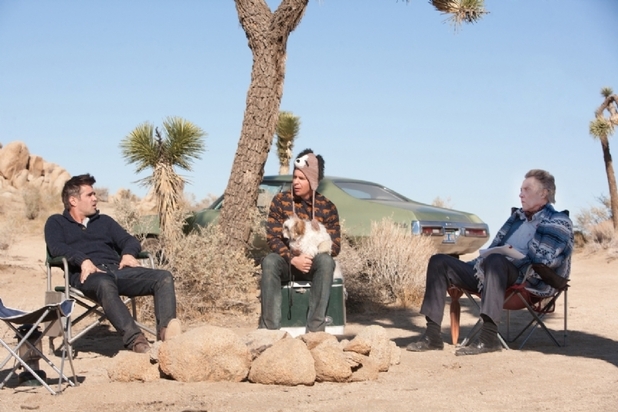Director: Sofia Coppola
Runtime: 94 minutes
"There's a war going on, out there, somewhere..." So goes the opening line of current Broadway smash Natasha, Pierre, and the Great Comet of 1812. Cannons and guns wreak havoc in the periphery, while a different conflict is waged in the battlefield of opera houses and parlors among those privileged enough to get out of service. A similar framing device hangs over the characters of The Beguiled as well, draped over like a protective veil made of smoke, fog, and moss. Both works exist in realms of refinement, though the latter finds its characters staving off the ugly reality bubbling just outside their line of sight.
Given that this is a Sofia Coppola film, none of this is terribly surprising. Her specialty has always been her ability to chronicle the shut-off bubbles, specifically of upper class white women. Whether haunting hotel hallways amid the skyscrapers of Tokyo, or traipsing through an unguarded mansion in Beverly Hills, the notion of isolation is the connective thread holding her oeuvre together. Her adaptation of Thomas Cullinan's novel (previously adapted in the 70s with Clint Eastwood) immediately establishes itself as more of the same, at least thematically.
But the steady progression of The Beguiled (easily her tightest work of pacing) stealthily gives way to something unexpected: a heated, simmering psychological cat-and-mouse game. Or, rather, a cat-and-mice game. Beneath the Southern hospitality and longing glances cast out of windows is a delicious, cunning genre picture ready to claw its way out at any given moment. For once, Coppola allows her female characters to have their bubble punctured, and even violated. The muffled cannon blasts pepper the film's soundscape, but a different, twisty conflict is about to erupt not on the battlefield, but in a place designed to instill manners.
It takes only a few minutes before Corporal John McBurney (Colin Farrell) collapses on the doorstep of the Farnsworth home. Headed by the steely Miss Martha (Nicole Kidman), the household's exterior suggests a lack of maintenance, and even disarray. But lessons is music, etiquette, sewing, and French still occupy the time of the girls boarded up their by their wealthy Confederate families. And, being the proper Southern ladies they are, Martha's students and their teacher Edwina (Kirsten Dunst) help McBurney inside to treat his wounds.
McBurney is obviously injured, but there's still a palpable shock for the girls (and, frankly, the viewer), when his gruesome leg injury appears. Coppola loves her introverted, wan ladies, so to see something so lurid is a bit of a jolt. Not soon after, Miss Martha is sewing up McBurney's wound, in a grisly closeup that wouldn't seem out of place in a Guillermo Del Toro drama. Amid all of this, there is a great deal of lustrous closeups of Mr. Farrell's exposed chest and just as much heaving and "oh, my" breathing from the ladies.
Coppola has dipped her toes into new territory, and while she never takes a full plunge, her restraint is measured rather than timid. With a thick coat of fog, smoke, and mist smeared across many shots, The Beguiled lands firmly in the territory of Southern Gothic storytelling, albeit with an unconventional structure and sense of pace.
Using only natural/available light (daylight, candles, etc...), The Beguiled has the painterly look of Kubrick's Barry Lyndon, albeit with a color scheme more reminiscent of Goya or El Greco. Amid all the murk, the cinematographer Philippe Le Sourd conjures up an array of sharp images. Most transfixing are the closeups, of people handling tools, utensils, or bowls. The Farnsworth Academy may be a bit Brigadoon-esque in its removal from the "real" world, but it's still grounded in a tactile sense of place and time. The fineries of life are all these girls and women have to hold on to, other than each other. And so they clasp on, never giving an inch, whether it's to a wine glass or a gun.
Inevitably, a misshapen lust triangle emerges from the fog, and Coppola finally lights the fuse that's been sitting in the corner the whole time. Coppola has shown she can generate tension (Taissa Farmiga playing with a gun in The Bling Ring), but it's never been stretched out in any of her films. The wind up is masterfully done, and when the fuse finally reaches its lengthy end, the resulting display doesn't underwhelm.
There is little outright violence in The Beguiled, despite the early flash of gore, though what occurs lands well. More compelling, however, are the little digs and power plays initiated through dialogue, glances, and gestures. Kidman, delivering an antidote to her work in Cold Mountain, takes center stage amid the uniformly strong ensemble. In every meeting (many of which involve most of, or all, of the cast), he eyes seem to be in constant motion. She's keeping tabs on Edwina, the students, and McBurney all at once. The subtlety on display is, like the film as a whole, a wicked delight. Dunst, a Coppola regular, is gently and affecting as Edwina, who wants nothing more than to get as far away as possible. Farrell, as the object of the film's Female Gaze, is excellent too, crafting an intelligent portrait of a man who goes from victim to manipulator (and then back again).
Tonally, it's not all doom and gloom and ripped bodices. There is a tart sense of humor that hangs in the air along with the perfume, sweat, and hormones. At times, The Beguiled is basically a Gothic-accented comedy of manners. That is, until certain lines are crossed, and the battle lines are drawn. The bubble must be protected after all, and it will be done with a stiff upper lip, a beautiful gown, a prayer, and a very carefully constructed recipe. With a flirty, dangerous wink, Coppola signs off with one of those gems of Southern charm that can be wielded as an invitation or a weapon: Y'all come back now...
Grade: A-







